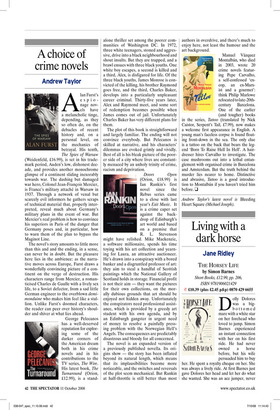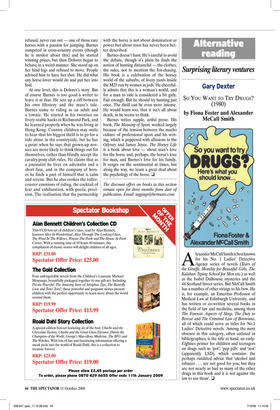Living with a dark horse
Jane Ridley
THE HORSEY LIFE by Simon Barnes Short Books, £12.99, pp. 206, ISBN 9781906021429 ✆ £10.39 (plus £2.45 p&p) 0870 429 6655 Dolly Dolores was a bigbottomed mare with a white star on her forehead who loved to jump. Simon Barnes experienced an instant connection with her on his first ride. He had never owned a horse before, but his wife persuaded him to buy her. He spent a royalty cheque on her. She was always a lively ride. At first Barnes just gave Dolores her head and let her do what she wanted. She was an ace jumper, never refused, never ran out — one of those rare horses with a passion for jumping. Barnes competed in cross-country events (though he is modest about this) and he started winning prizes, but then Dolores began to behave in a weird manner. She stood up on her hind legs and refused to move. People advised him to have her shot. He did what any horse-lover would do and put her into foal.
At one level, this is Dolores’s story. But of course Barnes is too good a writer to leave it at that. He sets up a riff between his own lifestory and the mare’s tale. Barnes came to riding as an adult and a townie. He started in his twenties on livery-stable hacks in Richmond Park, and he learned properly when he was living in Hong Kong. Country children may smile to hear that his biggest thrill is to go for a ride alone in the countryside, but he has a point when he says that grown-up novices are more likely to think things out for themselves, rather than blindly accept the cavalry/pony club rules. He claims that as a journalist he lives on adrenalin and a short fuse, and in the company of horses he finds a part of himself that is calm and serene. But he also evokes the rollercoaster emotions of riding, the cocktail of fear and exhilaration, with poetic precision. The realisation that the partnership with the horse is not about domination or power but about trust has never been better described.
Barnes doesn’t hunt. He’s careful to avoid the debate, though it’s plain he finds the notion of hunting distasteful — the clothes, the rules, not to mention the fox-chasing. His book is a celebration of the horsey world of the suburbs, of livery yards inside the M25 run by women in jods. He cheerfully admits that this is a woman’s world, and for a man to ride is considered a bit girly. Fair enough. But he should try hunting just once. The thrill can be even more intense. He would learn too, that it isn’t all about death, as he seems to think.
Barnes writes supple, artful prose. His book, The Meaning of Sport, worked largely because of the tension between the macho culture of professional sport and his writing, which is peppered with allusions to the Odyssey and James Joyce. The Horsey Life is a book about love — about man’s love for the horse and, perhaps, the horse’s love for man, and Barnes’s love for his family. It verges on the sentimental at times, but along the way, we learn a great deal about the psychology of the horse. ❑ The discount offers on books in this section remain open for three months from date of publication. Email: taggings@bertrams.com











































































 Previous page
Previous page